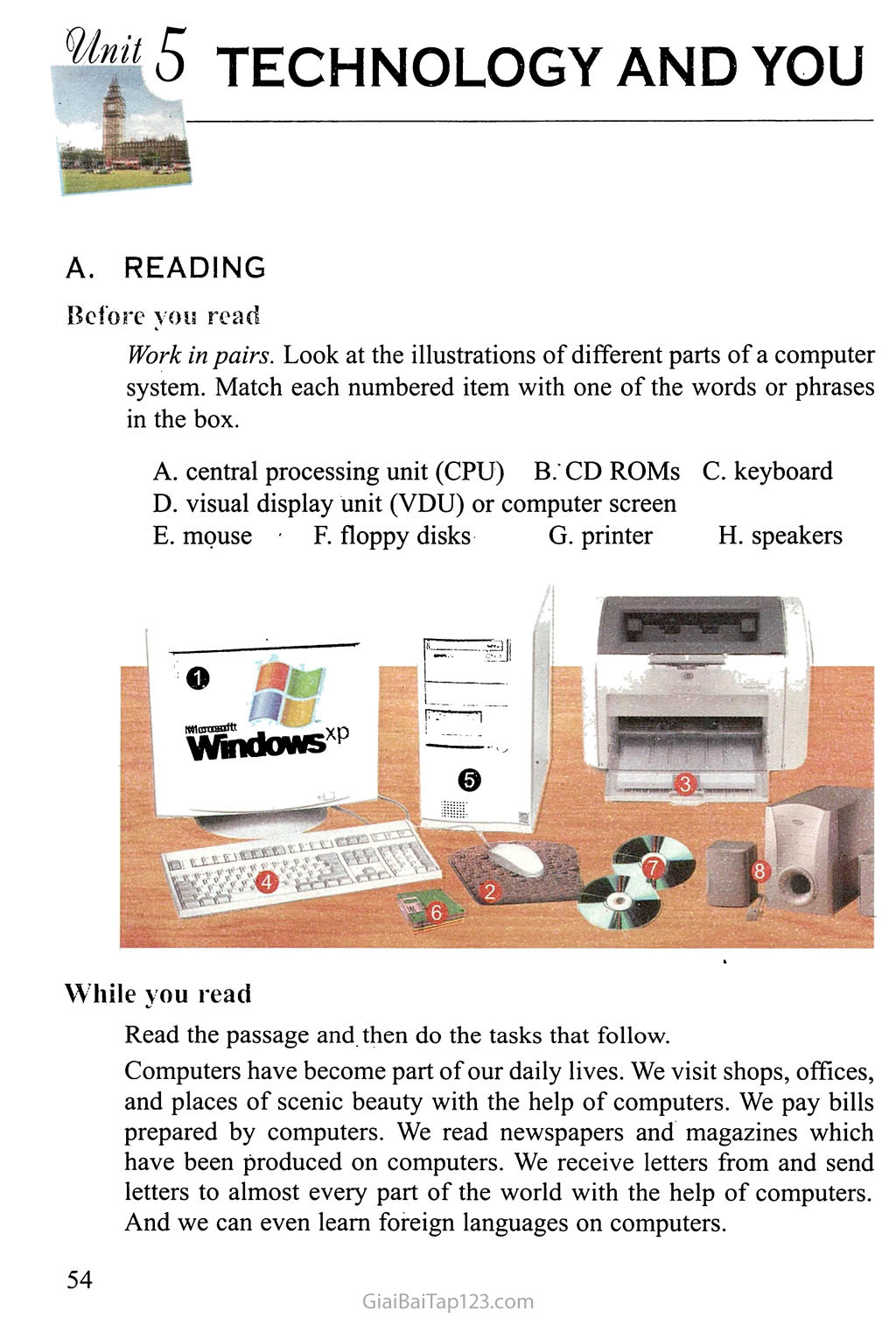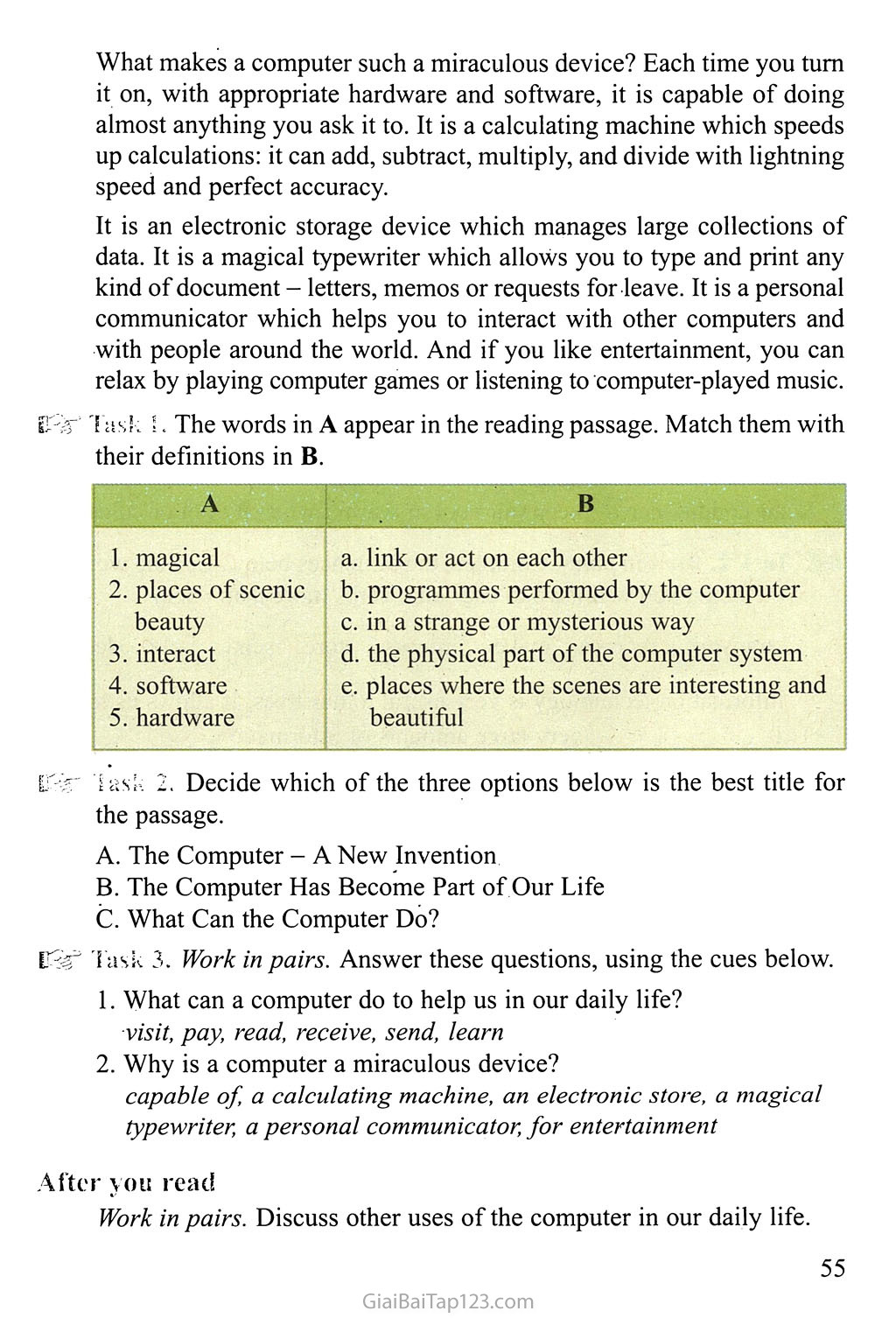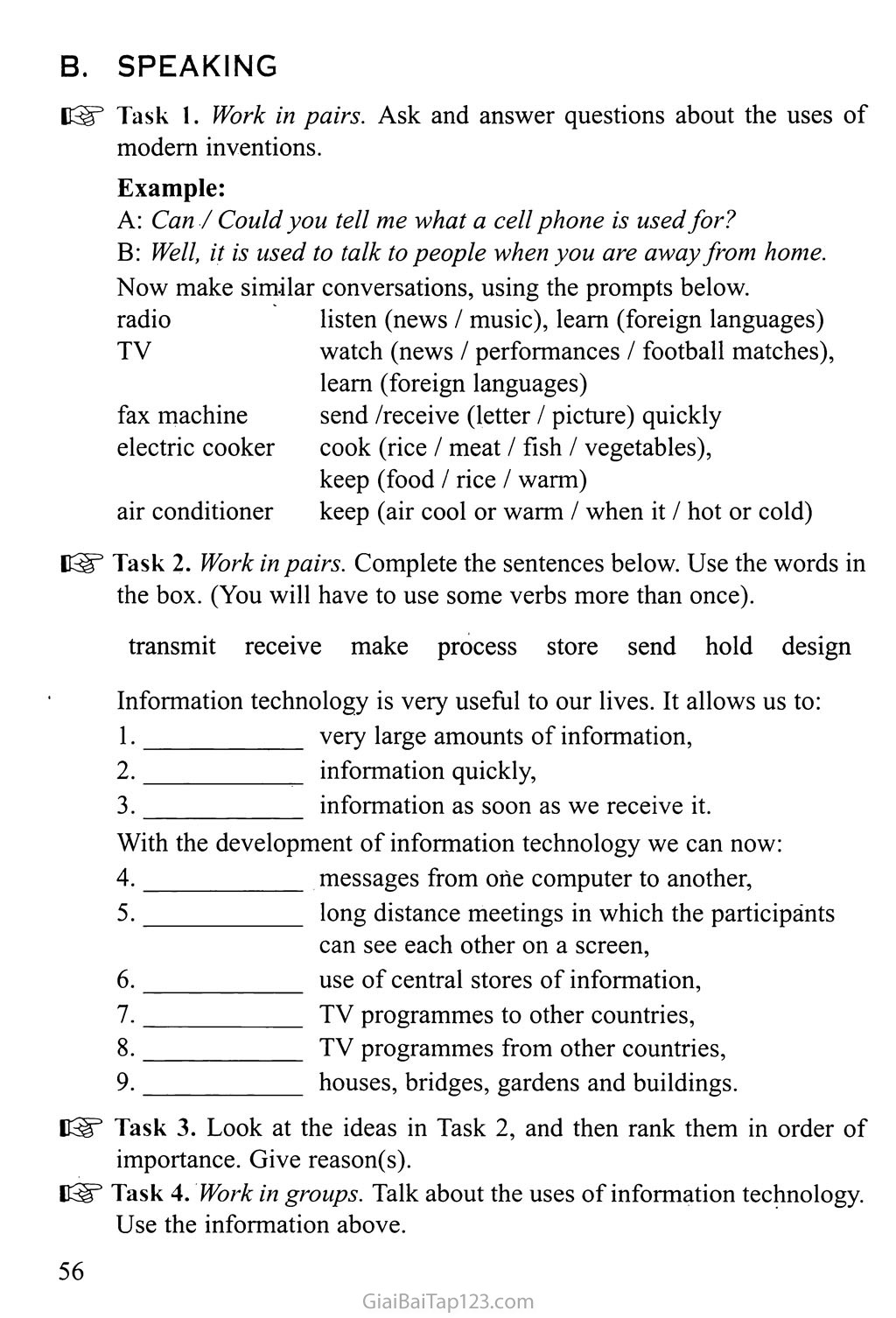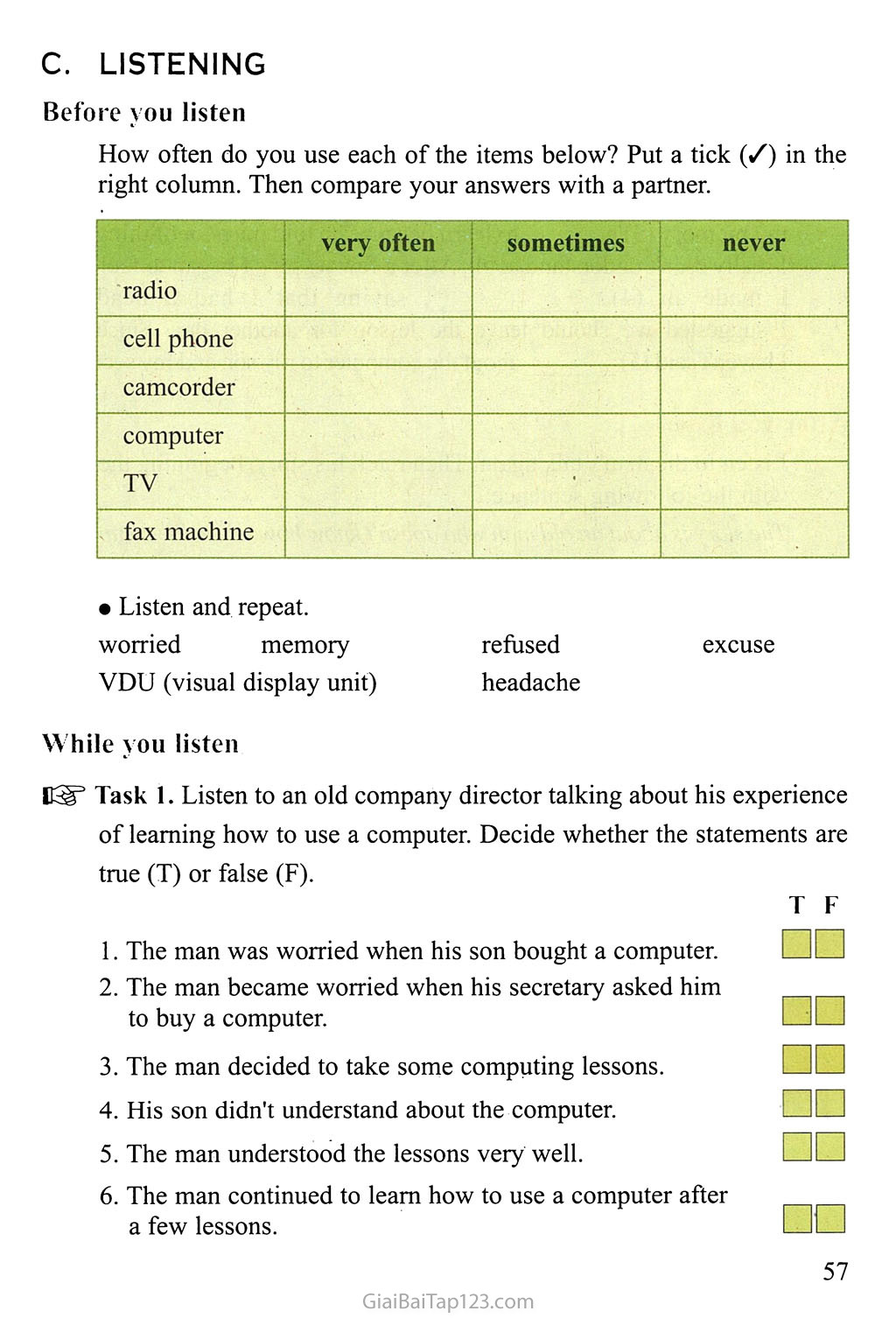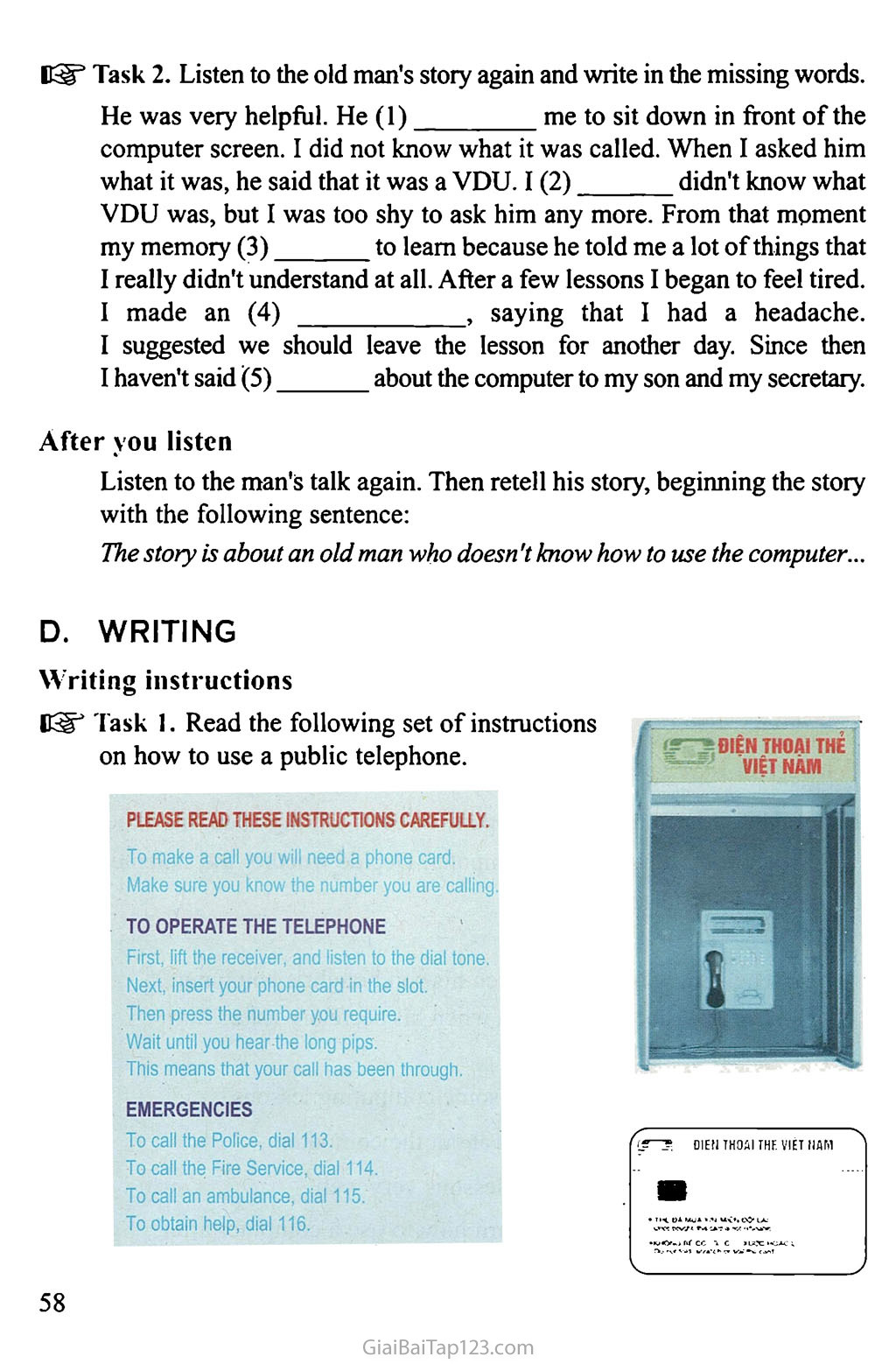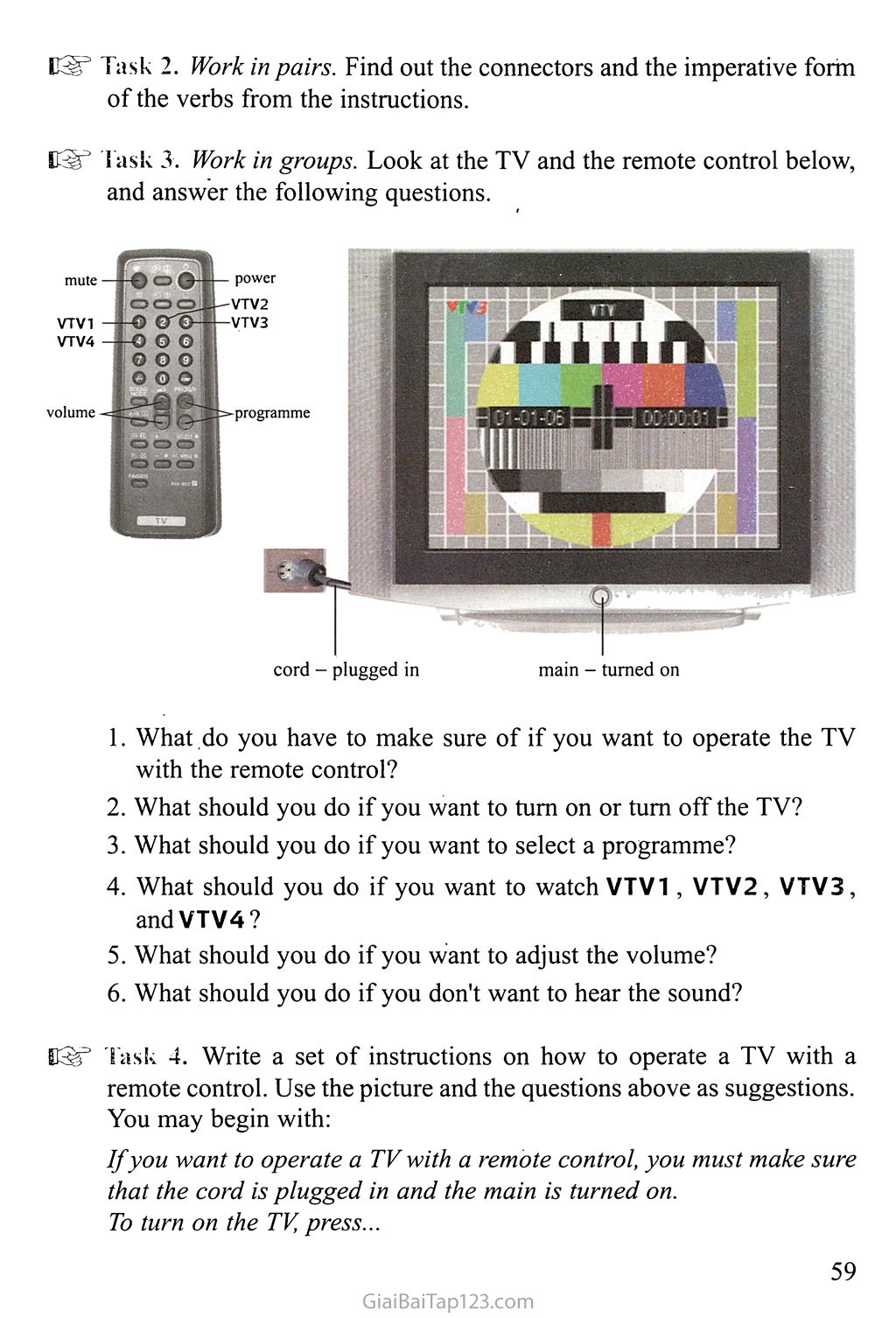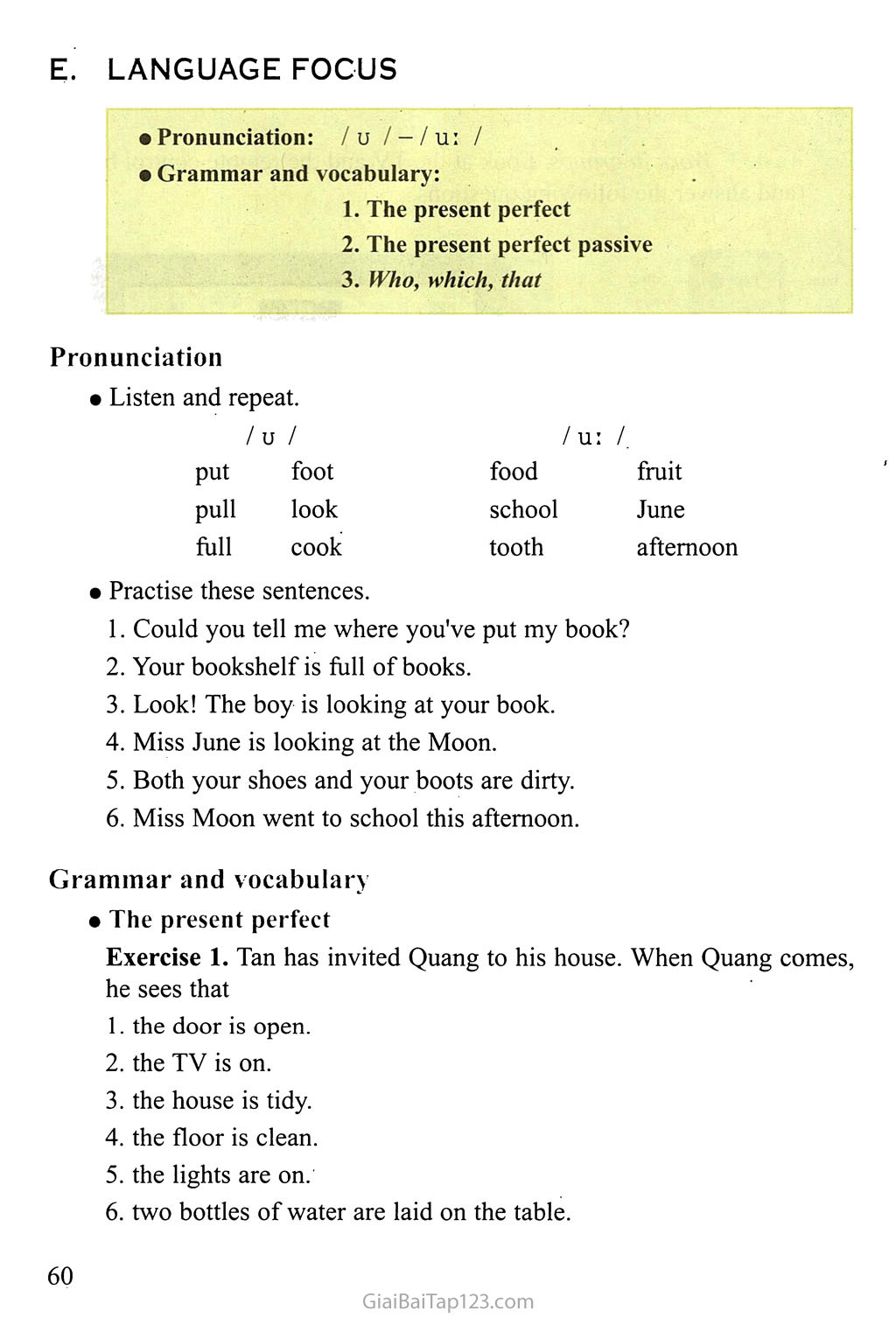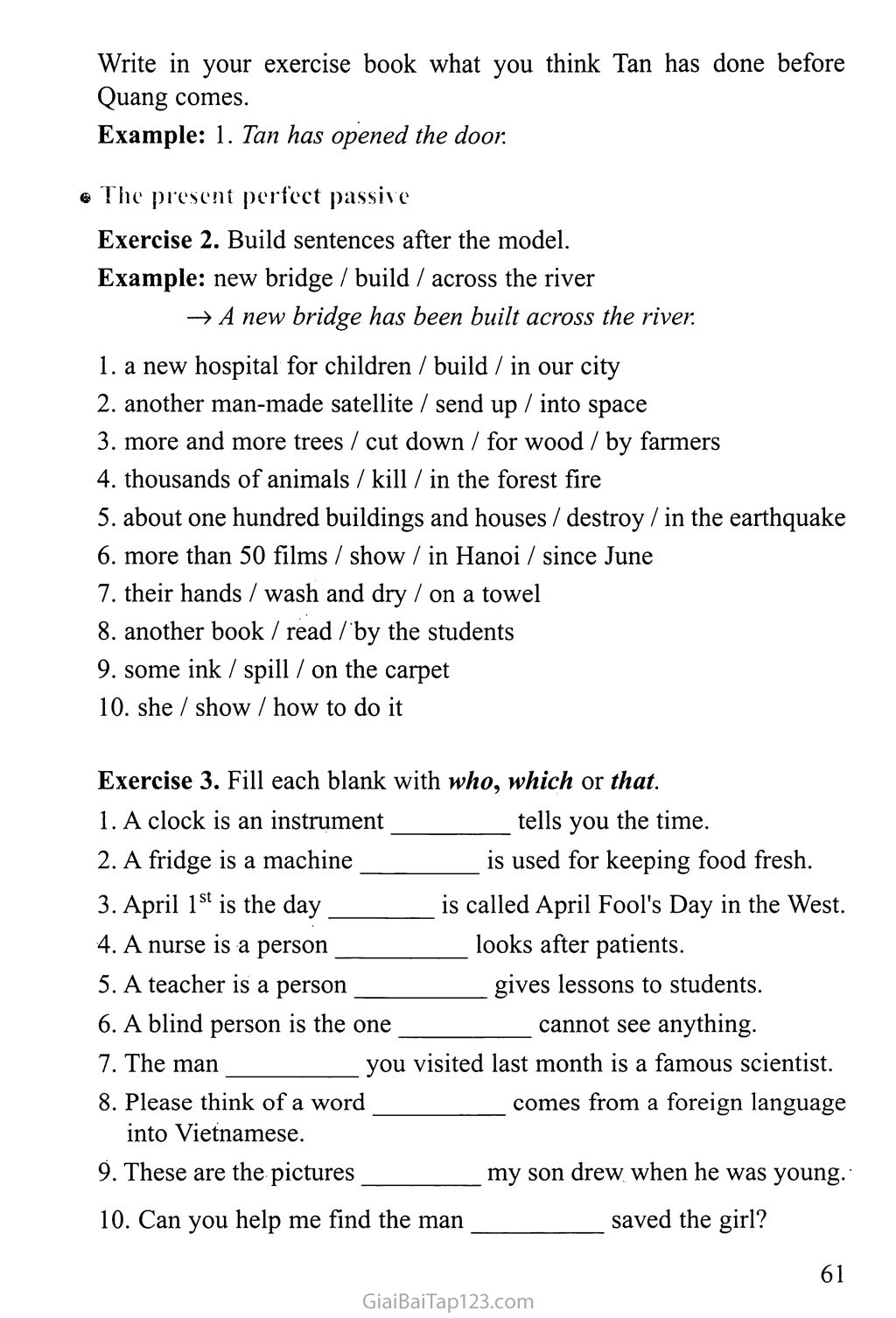SGK Tiếng Anh 10 - Unit 5: TECHNOLOGY AND YOU
z 5 TECHNOLOGY AND YOU A. READING Before you read Work in pairs. Look at the illustrations of different parts of a computer system. Match each numbered item with one of the words or phrases in the box. A. central processing unit (CPU) B. CD ROMs c. keyboard visual display unit (VDU) or computer screen mouse F. floppy disks G. printer H. speakers While you read Read the passage and then do the tasks that follow. Computers have become part of our daily lives. We visit shops, offices, and places of scenic beauty with the help of computers. We pay bills prepared by computers. We read newspapers and magazines which have been produced on computers. We receive letters from and send letters to almost every part of the world with the help of computers. And we can even learn foreign languages on computers. What makes a computer such a miraculous device? Each time you turn it on, with appropriate hardware and software, it is capable of doing almost anything you ask it to. It is a calculating machine which speeds up calculations: it can add, subtract, multiply, and divide with lightning speed and perfect accuracy. It is an electronic storage device which manages large collections of data. It is a magical typewriter which allows you to type and print any kind of document - letters, memos or requests for leave. It is a personal communicator which helps you to interact with other computers and with people around the world. And if you like entertainment, you can relax by playing computer games or listening to computer-played music. CSẵ3 Tas The words in A appear in the reading passage. Match them with their definitions in B. . A B magical places of scenic beauty interact software hardware link or act on each other programmes performed by the computer in a strange or mysterious way the physical part of the computer system places where the scenes are interesting and beautiful Decide which of the three options below is the best title for the passage. The Computer - A New Invention The Computer Has Become Part of Our Life c. What Can the Computer Do? O21 Ta‘ Work in pairs. Answer these questions, using the cues below. What can a computer do to help US in our daily life? visit, pay, read, receive, send, learn Why is a computer a miraculous device? capable of, a calculating machine, an electronic store, a magical typewriter, a personal communicator, for entertainment After you read Work in pairs. Discuss other uses of the computer in our daily life. B. SPEAKING Task 1. Work in pairs. Ask and answer questions about the uses of modem inventions. Example: A: Can / Could you tell me what a cell phone is used for? listen (news / music), learn (foreign languages) watch (news / performances / football matches), leam (foreign languages) send /receive (letter / picture) quickly cook (rice / meat / fish / vegetables), keep (food / rice / warm) keep (air cool or warm / when it / hot or cold) B: Well, it is used to talk to people when you are away from home. Now make similar conversations, using the prompts below, radio TV fax machine electric cooker air conditioner IW Task 2. Work in pairs. Complete the sentences below. Use the words in the box. (You will have to use some verbs more than once), transmit receive make process store send hold design Information technology is very useful to our lives. It allows US to: very large amounts of information, information quickly, information as soon as we receive it. With the development of information technology we can now: messages from one computer to another, long distance meetings in which the participants can see each other on a screen, use of central stores of information, TV programmes to other countries, TV programmes from other countries, houses, bridges, gardens and buildings. mv Task 3. Look at the ideas in Task 2, and then rank them in order of importance. Give reason(s). CSlf Task 4. Work in groups. Talk about the uses of information technology. Use the information above. c. LISTENING Before you listen How often do you use each of the items below? Put a tick (Z) in the right column. Then compare your answers with a partner. very often — sometimes never radio cell phone camcorder computer TV • fax machine • Listen and repeat. worried memory refused excuse VDU (visual display unit) headache While you listen Task i. Listen to an old company director talking about his experience of learning how to use a computer. Decide whether the statements are true (T) or false (F). T F The man was worried when his son bought a computer. The man became worried when his secretary asked him to buy a computer. The man decided to take some computing lessons. His son didn't understand about the computer. The man understood the lessons very well. The man continued to learn how to use a computer after a few lessons. Task 2. Listen to the old man's story again and write in the missing words. He was very helpful. He (1) me to sit down in front of the computer screen. I did not know what it was called. When I asked him what it was, he said that it was a VDƯ. I (2) didn't know what VDU was, but I was too shy to ask him any more. From that moment my memory (3) to learn because he told me a lot of things that I really didn't understand at all. After a few lessons I began to feel tired. I made an (4) saying that I had a headache. I suggested we should leave the lesson for another day. Since then I haven't said (5) about the computer to my son and my secretary. After you listen Listen to the man's talk again. Then retell his story, beginning the story with the following sentence: The story is about an old man who doesn 't know how to use the computer... D. WRITING Writing instructions Read the following set of instructions on how to use a public telephone. PLEASE READ THESE INSTRUCTIONS CAREFULLY. To make a call you will need a phone card. Make sure you know the number you are calling. TO OPERATE THE TELEPHONE First, lift the receiver, and listen to the dial tone. Next, insert your phone card in the slot. Then press the number you require. Wait until you hear the long pips'. This means that your call has been through. EMERGENCIES To call the Police, dial 113. To call the Fire Service, dial 114. To call an ambulance, dial 115. 5“?:ĐIÊN ĨHOAI THE. VIETNAM s • THÈ ĐẤ MUA XỈN MJỂN ĐÓl LAI Ohcc BouqhL this card o n« rifmaOic •KHONG BÈ CONG, CÀO XƯÓC HOẠC LAM BAN THE Do CO! fold, scratch Of sou’ (ho card O?»t«SISỈ7 To obtain help, dial 116. Kg"5 Task 2. Work in pairs. Find out the connectors and the imperative form of the verbs from the instructions. K3Y Task 3. Work in groups. Look at the TV and the remote control below, and answer the following questions. cord - plugged in main - turned on VTV1 VTV4 volume power What do you have to make sure of if you want to operate the TV with the remote control? What should you do if you want to turn on or turn off the TV? What should you do if you want to select a programme? What should you do if you want to watch VTV1 , VTV2, VTV3, andVTV4? What should you do if you want to adjust the volume? What should you do if you don't want to hear the sound? ngr Task 4. Write a set of instructions on how to operate a TV with a remote control. Use the picture and the questions above as suggestions. You may begin with: If you want to operate a TV with a remote control, you must make sure that the cord is plugged in and the main is turned on. To turn on the TV, press... Ẹ LANGUAGE FOCUS Pronunciation: /u / -/u: / Grammar and vocabulary: The present perfect The present perfect passive Who, which, that Pronunciation • Listen and repeat. / u / / u: / put foot food fruit pull look school June full cook tooth afternoon Practise these sentences. Could you tell me where you've put my book? Your bookshelf is full of books. Look! The boy is looking at your book. Miss June is looking at the Moon. Both your shoes and your boots are dirty. Miss Moon went to school this afternoon. Grammar and vocabulary The present perfect Exercise 1. Tan has invited Quang to his house. When Quang comes he sees that the door is open. the TV is on. the house is tidy. the floor is clean. the lights are on. two bottles of water are laid on the table. Write in your exercise book what you think Tan has done before Quang comes. Example: 1. Tan has opened the door. • The present perfect passive Exercise 2. Build sentences after the model. Example: new bridge I build / across the river —> A new bridge has been built across the river. a new hospital for children / build / in our city another man-made satellite / send up / into space more and more trees / cut down / for wood / by farmers thousands of animals / kill / in the forest fire about one hundred buildings and houses / destroy / in the earthquake more than 50 films / show / in Hanoi / since June their hands / wash and dry / on a towel another book / read / by the students some ink / spill / on the carpet she / show / how to do it Exercise 3. Fill each blank with who, which or that. A clock is an instrument tells you the time. A fridge is a machine is used for keeping food fresh. April 1st is the day is called April Fool's Day in the West. A nurse is a person looks after patients. A teacher is a person gives lessons to students. A blind person is the one cannot see anything. The man you visited last month is a famous scientist. Please think of a word comes from a foreign language into Vietnamese. These are the pictures my son drew when he was young. Can you help me find the man saved the girl?

